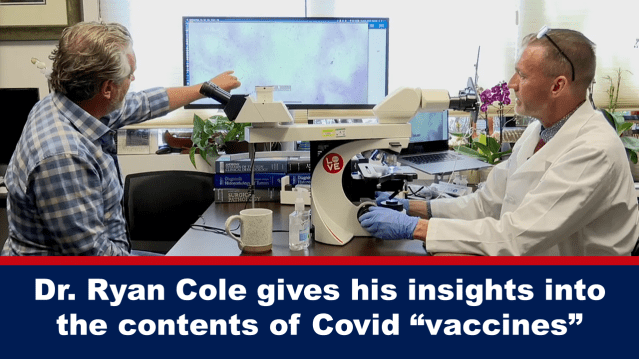Dr. Ryan Cole gives his insights into the contents of Covid “vaccines”
We know the contents of Covid injections are inconsistent and vary from batch to batch. However, there is debate among independent researchers about some of the ingredients being found in “vaccine” vials, for example, graphene oxide and nanotechnology.
Last week we published an article about two sessions of the International Crimes Investigative Committee where researchers from both sides of the debate had their say. Now Dr. Ryan Cole adds his knowledge and experience to the debate during an episode of The HighWire.
American Dr. Ryan Cole has been a pathologist for 26 years. He has spent many thousands of hours throughout his career looking at samples under microscopes. His latest appearance on The HighWire was not the usual style of interview: Del Bigtree visited Dr. Cole’s laboratory to get a first-hand look under microscopes to find out what is true, and what is not, about Covid injections, along with unusual samples from post-mortem vaccinated patients. Then, Bigtree tested his own blood on each one of the Covid injections. They then convened at The HighWire’s studio to discuss in more detail what they had found.
Before we get to his latest interview with The HighWire, a useful explanation of differing reactions after being injected. Dr. Cole proposed why many vaccinated were lucky not to get injured by the dangerous Covid injections during a panel discussion at the Better Way Conference in Vienna, Austria. He explained that vials weren’t kept cold before administering the injection and the mRNA broke down “into nothing.” In addition, concentrations of mRNA vary between vials due to poor manufacturing processes. So, not everyone has received a dose, or the same dose, of mRNA.
27 October 2022 (2 mins)
Bigtree and Dr. Cole began with a discussion about the rubbery fibrous structures or clots that embalmers have been finding in deceased after the rollout of Covid injections. Dr. Cole has never seen these types of clots before. He placed some samples under the microscope for viewers to compare to the usual clots. They’re congealed protein, an amyloid-like material, he said. Dr. Cole referred to work done by Dr. Etheresia Pretorius who has published papers on amyloid fibrin micro clots.
You can watch The HighWire’s investigation of the contents of the Covid injections with Dr. Cole on Rumble below or The HighWire’s website HERE.
In the video above, BigTree’s visit to Dr. Cole’s laboratory and the analysis of Covid injections begins at around the 27-minute mark, a few of the highlights from this section are shown below.
Last month we published an article ‘Scientists worldwide claim all Covid-19 Vaccines contain Nanotechnology & Graphene Oxide’. In some respects, Bigtree and Dr. Cole’s investigation can be taken as a response to that article.
Let’s not lose touch…Your Government and Big Tech are actively trying to censor the information reported by The Exposé to serve their own needs. Subscribe now to make sure you receive the latest uncensored news in your inbox…
The following is an adaptation of an article published by The Vigilant Fox titled ‘Dr. Ryan Cole Addresses Covid-19 Jab Claims: Graphene Oxide, Nanotech, Parasites’ which you can read HERE.
Graphene Oxide
They saw some rod-shaped objects.
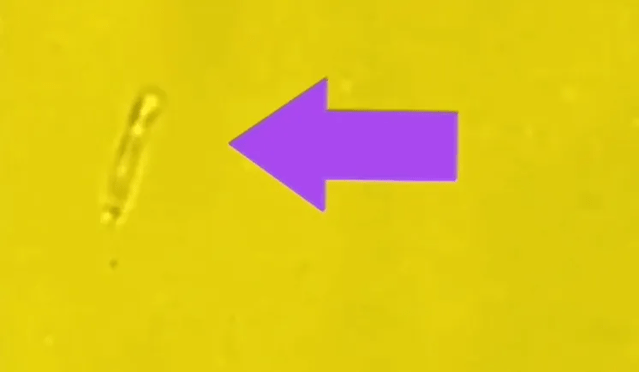
But when they turned on their sides, they appeared as flat plates. Is this graphene oxide?
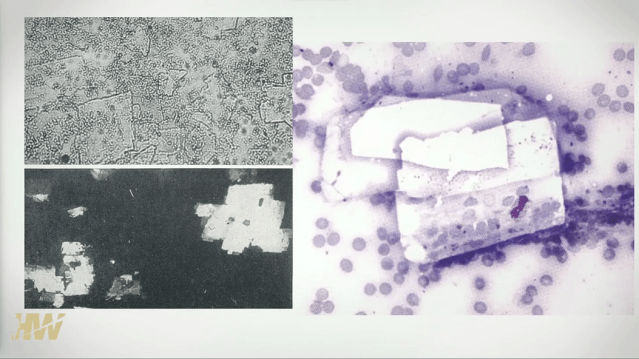
“These are cholesterol crystals,” Dr. Cole said.
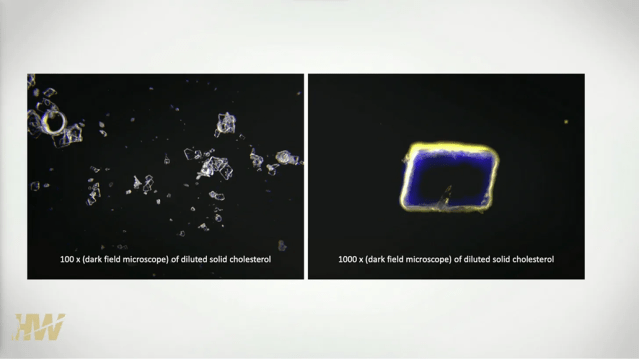
“That spike protein is incredibly inflammatory to the lining of our blood vessels. All of us have a little cholesterol plaque on the walls of our vessels. But when you get that inflammatory process going, now, those cholesterol crystals, due to inflammation, are broken loose. So, they get cast off,” explained Dr. Cole.
Nanotechnology
“So, look at this,” directed Cole. “Well, doesn’t that look like microcircuitry and a self-assembling nanochip?” he asked.
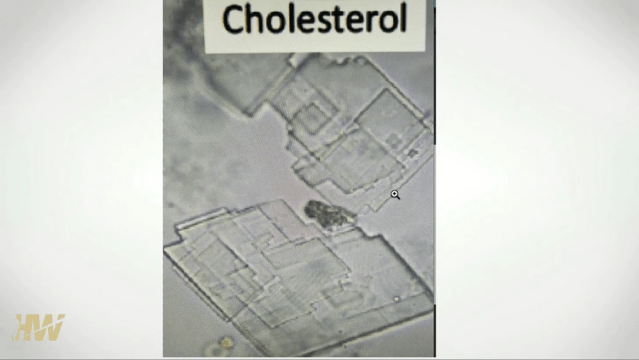
“No, it’s just stacked-layered cholesterol.”
Contaminants
“Okay, are there contaminants?” asked Dr. Cole. “Sure,” he answered. “Are there metallic particles in these? Yes, aluminium, silicon, magnesium, sodium chloride, calcium, titanium, iron, etc.”
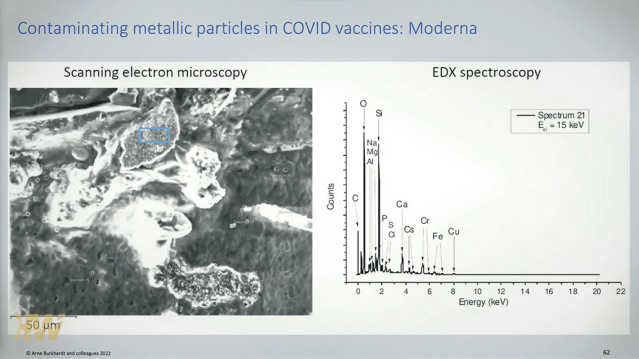
He also explains, “A small study was done that showed if you took some fluid out of the vials with a pipette, took some out with a needle, some of these metals are actually coming from rapidly-manufactured needles.”
Polyethylene Glycol
Is there polyethylene glycol (“PEG”) in these shots? You bet. But “it’s not antifreeze from your car,” clarified Dr. Cole. And what it does is preserve and protect the nanoparticle at cold temperatures.
Take note that many people are allergic to this material – which accounted for many of the incidents of acute anaphylactic shock – and often death – directly after the shot.
But the main takeaway, according to Dr. Cole, is that polyethylene glycol is a harmful molecule that inhibits the ability of macrophages to present an antigen and stimulate an immune response. And the amount in each injection was inconsistent, it was “all over the map.”
Parasites
This looks scary. What is this?
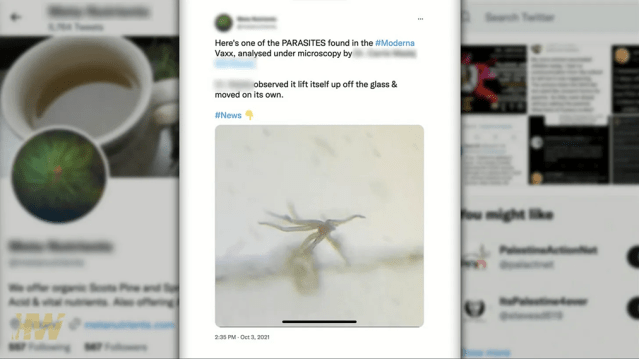
“That’s from the bottom of a leaf,” answered Ryan Cole. It’s called a stellate trichome.
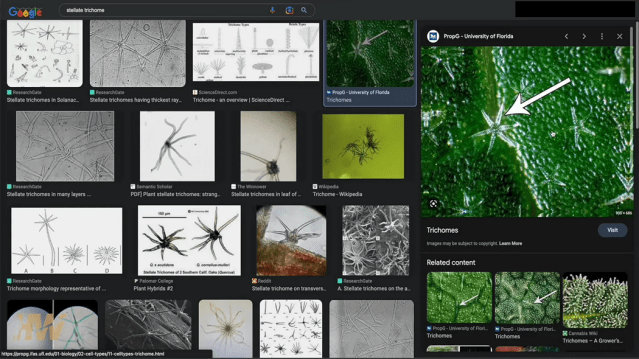
“If you’re doing microscopy in a living room, or you’re doing it in a non-laboratory setting, you’re gonna get all sorts of particulates in the air,” explained Cole. “That’s a bottom of a leaf floating around in the air.”
Conclusion
“Over 100 vials [have] gone through mass spec[trometry]. Really the burning question for me [is] did we find graphene oxide in any of the vaccines?” asked Bigtree.
“Absolutely not,” answered Dr. Cole. “Zippo, zero, nada – none.”
“And so, those little flakes that we were seeing — those little lines and floating things, those are three things — those cholesterol crystals we saw. And there’s a cholesterol-cholesterin spike on some of these mass spec graphs. And Pfizer has a lot of salt and some sugars. Moderna has more sugar — a little less salt. And we’re also seeing those little plates are also salt flakes and salt crystals, these cholesterol crystals, and sugar crystals as well,” Dr. Cole said.
“And so, at the end of the day, the mass spec showed that that’s what it was. These vials have lipid content. They have polyethylene glycol content in varying ratios. They have salts. They have sugars. They do have genetic material. And that’s what was in the vials. And then, some lots had some contaminants.”
